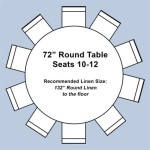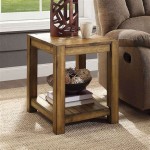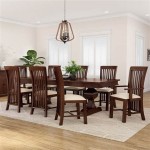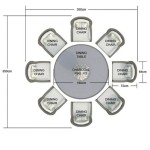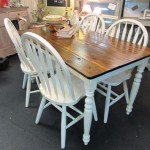Round Dining Table Vs Rectangular
When selecting a dining table, two popular shapes to consider are round and rectangular. Both options offer unique advantages and disadvantages depending on your specific needs and preferences. Here's a comprehensive comparison of round and rectangular dining tables to help you make an informed decision.
Shape and Functionality
The shape of the table influences its functionality and space utilization. Round tables create a more intimate and inviting atmosphere, as all diners can easily see and converse with each other. They are ideal for smaller dining rooms or intimate gatherings as they maximize space while accommodating guests comfortably. Rectangular tables, on the other hand, provide a more formal and structured seating arrangement. They are suitable for larger gatherings and offer ample space for serving dishes and drinks. Additionally, rectangular tables can be extended to accommodate more guests when needed.
Size and Seating Capacity
The size of the table is determined by the number of guests it needs to accommodate. Round tables generally have a smaller seating capacity compared to rectangular tables. A standard round table with a diameter of 48 inches can comfortably seat up to six people. Rectangular tables, on the other hand, can accommodate more diners due to their elongated shape. A 6-foot rectangular table, for example, can seat up to eight people comfortably.
Aesthetic Appeal
The aesthetic appeal of a dining table is subjective and depends on personal taste. Round tables often convey a more casual and inviting ambiance, while rectangular tables have a more formal and traditional look. Round tables create a sense of equality and intimacy as all diners are seated at the same level. They are well-suited for modern and contemporary decor styles. Rectangular tables, on the other hand, offer a more structured and traditional dining experience. They are ideal for classic and elegant dining rooms.
Space Utilization
When it comes to space utilization, round tables are more efficient in smaller dining rooms. Their circular shape allows them to fit into corners or awkward spaces more easily. Rectangular tables require more space due to their elongated shape, making them suitable for larger dining areas. It is important to consider the size of the dining room and the available space when choosing between a round or rectangular table.
Pros and Cons
To summarize, let's consider the pros and cons of each shape:
Round Tables
Pros:- Intimate and inviting atmosphere
- Space-efficient in smaller dining rooms
- Maximizes seating capacity for the available space
- Casual and modern aesthetic appeal
- Smaller seating capacity compared to rectangular tables
- May not be suitable for larger gatherings
Rectangular Tables
Pros:- More formal and structured seating arrangement
- Ample space for serving dishes and drinks
- Can be extended to accommodate more guests
- Traditional and elegant aesthetic appeal
- Requires more space compared to round tables
- May convey a less intimate atmosphere

Round Vs Rectangular Dining Tables Which Is Better For You Frwd By Cuura Space
Round Vs Rectangular Dining Tables Which Is Better For You Frwd By Cuura Space

Rectangle Vs Round Dining Tables Living With Style

Blog House Of Oak

Rectangle Vs Round Dining Table Which Is Best Hemming Wills

Round Dining Tables Vs Rectangular Which Is Right For Your Singapore Home Star Living

Round Vs Rectangular Dining Tables Choose The Best For Your Space

Round V Rectangular Dining Room Tables Which One Is Best For Your Space Homes Gardens

Why A Round Dining Table Might Be Your Best Option Abide Interiors

Picking The Right Dining Table It Is Not Only Round Or Rectangular Homify


